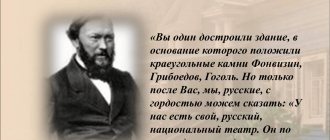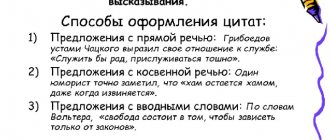Book wisdom
Interesting and short quotes with meaning from books - knowledge that you are not ashamed to share with friends.
- Perhaps the best solution would be to live with your eyes closed. After all, if you don’t notice evil, then you can imagine that it doesn’t exist at all.
- It seems to many that the essence of riddles is to be solved... But this works completely differently! The best riddles have still not been answered.
- All the best that is in this world is not created by good or evil, but is a product of their opposition.
- When I say that I like someone, it is actually my declaration of love and even more. That's the kind of person I am.
- Do you know what unites us all? This is not love and other mythological nonsense, but a craving for the stars! There has not yet been a person born on earth who could look at the starry sky and not think about eternity, even for a second...
- Sharing stupid things together only strengthens friendship, but it’s better not to be naughty alone!
- Nothing changes here. There are still a lot of people who are trying to teach you how to live... but at the same time they don’t know how to do anything themselves.
- If you look at a deserted beach for a long time, it begins to seem that it lacks people. And if you look at people for a long time, sooner or later you begin to dream of a deserted beach. Vicious circle.
- Yes, I am the most gentle and most affectionate! I'm like a little cactus that hasn't yet grown the needles with which it will kill!
- Love is not a thing in itself. You have to know how to love, you have to learn love, you have to train love!
- Sadness is a place from which no one has yet managed to get out on their own.
- It's better to let people be who they really are than to pretend to be someone else.
- We must not forget about the past. It does not die, but becomes part of our essence.
Winter paintings from “Eugene Onegin”
Ivan Shishkin. Winter. 1890. State Russian Museum, St. Petersburg
Here the north, driving up the clouds, breathed and howled - and here comes the sorceress winter herself. She came and fell apart; Hanged in clumps on the branches of oak trees; Lay down in wavy carpets Among the fields, around the hills; The river has leveled the river like a plump veil; Frost flashed. And we are glad for the pranks of Mother Winter.
Alexander Pushkin. "Eugene Onegin"
In the "encyclopedia of Russian life" - the novel in verse "Eugene Onegin" by Alexander Pushkin - there is a lot of landscape poetry. And the poet describes winter in the work three times: in the fourth, fifth and seventh chapters. Twice he talks about the cold in the village, the habits and affairs of its inhabitants - peasants and nobles. And in the seventh chapter, Pushkin described winter in St. Petersburg: “On the blue, cut ice / The sun is playing; It’s dirty melting / The snow is dug up in the streets.”
Pushkin used landscape lyrics in Eugene Onegin for different purposes. He needs descriptions of winter both to complement the portrait of the main character, Eugene Onegin, and to show the life and customs of the inhabitants of Russia in the first half of the 19th century.
In English
It seems that the wisest books are published in English? A selection of translations of short quotes from the smartest books!
- If they wished you something good, this does not mean at all that they do not want to kill you...
- It’s simply amazing how easy it is to find an elegant workaround in the morning for something that seemed inevitable in the evening.
- If you sigh for every reason, then you will have no time to breathe!
- Charm is an invariable attribute of a self-confident person. Suspicious people are simply pathologically incapable of being charming.
- Sometimes love takes such unknown and vulgar forms that it becomes almost impossible to see love in it.
- It is impossible to part with a person who, even after years, remains the best thing that has ever happened to you.
- In books people see only what they want to see. This is how the world works.
- The shards of his smiles can cut the steel of any nerves.
- Rushing in love is as harmful as rushing to leave a trench in the middle of a battle.
- If something happens, it cannot be avoided. If fate has prepared a surprise for you, then you have to unpack it.
- No matter how difficult the path may seem, you will still complete it. There's no point in spreading snot here.
- It is easiest to judge those people who do not look attractive enough.
- The only problem you have to solve is to choose the winner in the battle between heart and mind.
Konstantin Dushenko
Quotes from Russian literature from “The Tale of the Regiment...” to the present day
I knew a man so little read that he had to compose his own quotations from the classics.
Stanislav Jerzy Lec
Preface
“QUOTES FROM RUSSIAN LITERATURE” is the first attempt to create an extensive collection of Russian literary quotations with precise links to the source and a convenient search engine. The book contains about 5,250 quotes from almost five hundred authors.
In addition to quotes from literary works, the following are taken into account:
the most famous statements of writers (including oral ones), not directly related to literature;
quotes from the works of critics and literary scholars;
some expressions and terms from the history of Russian literature;
famous statements of statesmen about Russian literature and writers;
quotes from poetic translations of the 18th – 19th centuries, which became part of Russian poetry;
quotes from romances and songs of literary origin in the 18th – 19th centuries. Song poetry of later times, generally speaking, was not taken into account.[1] An exception was made for four representatives of the “art song” (Vertinsky, Okudzhava, Galich, Vysotsky).
In addition to well-known quotations, statements were included that are often quoted in specialized literature, as well as quotations that were previously popular and are often found in written texts of a certain era.
K. V. Dushenko
May 2005
How to use the directory
The directory consists of author's headings from “A” to “Z”[2]. Within the heading, quotations are arranged in alphabetical order of the names of the works; quotations from letters and oral statements are given at the end of the section.
Some of the largest headings have genre sub-headings; for example, the section “Dostoevsky” is divided into two parts: “Novels. Stories. Stories"; “Essays. Journalism. Letters."
For poetic works, in most cases two dates are indicated: the year of writing and the year of publication, for example:
“No, I’m not Byron, I’m different...” (1832; publ. 1845)
If the year of writing and publication coincide, the date is not repeated, but emphasized, for example:
“The thunder of victory, ring out!..” (1791)
If there is only one date that is not underlined, this is the date the poem was written. For original songs, only the date of their composition is given.
For prose works, only the date of publication is indicated (without the mark “published”); The exception is works published a considerable time after they were written.
Abbreviations are often used in references to the cited publication, for example:
Derzhavin, p. 128;
Poets of the 1820s - 1830s, p. 314
A list of source abbreviations is given at the end of the book. In “abbreviated” references to multi-volume publications, the volume number is first given, then, separated by a colon, the page number, for example:
Dostoevsky, 10:192 (that is: vol. 10, p. 192)
If the volume is divided into parts (books, half-volumes), the part number is indicated in parentheses after the volume number, for example:
Pushkin, 3(1):217 (that is: vol. 3, part 1, p. 217)
At the beginning of significant personal headings, the publication from which the bulk of the quotations of a given author is given is indicated (in some cases, two main publications); references to these publications are given in abbreviated form.
The title of the author's section indicates the most famous name of the author. Sometimes this is a “merging” of a real name with a literary pseudonym, established in reference literature, for example. "Saltykov-Shchedrin, Mikhail Evgrafovich"
.
Names of literary characters were included only in combination with other words ( “Second Lieutenant Kizhe”
,
“Sasha from Uralmash”
). The only exception is made for the “joined” surname “Tolstoyevsky”.
In quotes from the works of pre-revolutionary authors, the words “God”, “Lord”, “Creator”, etc. are capitalized (if we are talking about the God of monotheistic religions).
Information about music for poetry is given only in cases where the poem is known primarily as a song or romance; in this case, only the author of the most famous melody is indicated.
Dates until 14 Feb. 1918, relating to Russia, are given in the old style (except for special cases).
It should be borne in mind that in academic publications, spelling and punctuation are given in the author's edition and are often very different from the generally accepted ones.
The usual description scheme is as follows:
1. Quote. It follows the entry number and is in bold .
2. Below is the name and date of the source of the quotation; this paragraph is in italics
.
3. Next is a link to the printed publication; The link is preceded by a icon. The references provide a “lax” description of the source (with deviations from the rules of bibliographic description).
4. Further, if necessary, the quotation is given in a more complete or more accurate form; and then - information about its origin, predecessor quotes, quote rolls, paraphrases, etc.
In some cases, the citation information is combined into one paragraph. This applies primarily to oral statements, as well as to the section “Anonymous quotes and expressions”, which follows after the main, “author’s” part of the reference book.
An example taken from the personal column “Sukhovo-Kobylin” :
Always and everywhere Tarelkin was ahead. <…> When Progress was announced, he stood and walked in front of Progress - so that Tarelkin was already in front, and Progress was behind!
“The Death of Tarelkin” (1869), I, 15
Sukhovo-Kobylin, p. 151
Hence: “to go ahead of progress.”
The number before the quotation is used to locate it using the index located at the end of the book. In the index, a quotation can be found on the word “progress”:
Progress: Tarelkin was in front, and Progress was behind the S-300
and on the word “ahead”:
Ahead of progress S-300
(here "S
" – the first letter of the author's surname).
An example taken from the personal column “Lomonosov” :
* Conjugation of distant ideas.
“A Brief Guide to Eloquence...” (1748), § 27
Lomonosov, 7:111
“...One should not always discard those [ideas] that seem too far from the topic, because sometimes, being connected <...>, they can form considerable and decently combined ideas for the topic.”
The formulation “conjugation of distant ideas” appeared in the article by Yu. Tynyanov “Ode as an oratorical genre” (1927), section. 2. Tynyanov Yu. N. Poetics. History of literature. Movie. – M., 1977, p. 236.
In this example, an asterisk (*) before the quote indicates that it is in a different form than the original. The original, “correct” form is given after the third paragraph, along with some additional information.
Two asterisks (**) mark oral (often apocryphal) statements known only as reported by others. An example taken from the “Island” :
return 1
Song quotes of the twentieth century. are widely presented in my book “Dictionary of Modern Quotations” (3rd ed. - M.: Eksmo, 2005.).
return 2
The author's columns also include the following columns: “The Word of Daniil the Zatochnik”, “The Word of the Destruction of the Russian Land”, “The Word of Igor’s Host” and the column “Truth” (newspaper).
Books and friends
Short and interesting quotes with meaning from books that are worth remembering in good company.
- I am simply one of those who was able to live my life with dignity and not make enemies. Just an ordinary person...
- You can tolerate a lot with music. Music is the best doctor I could find.
- Strong feelings burn themselves out. So, if you once loved too much, you could lose the ability to love completely.
- If a person smiles and laughs, everything is fine with him. There is no need to teach him about life.
- Spring will forgive everyone. In spring, all problems will no longer be so insoluble, and the days will seem less gloomy. The main thing is to survive the winter...
- The temptation to read just one more page is the biggest enemy of my personal life.
- You cannot return what has already been lost. But you can find a new one that will be the same or even better.
- If the only thing you have left are memories of what could have been, but was not, then you are already dead.
- You just have to start moving - and the whole world will start moving after you.
- Any woman will sooner or later hate two things - dust on her dresser and her own man.
- Strong people are strong in everything, not just in something specific. This is the essence of human strength.
- People are damn interesting in their pursuit of perfection. These fools don’t even realize that the ideal exists only in their heads...
Winter in Oblomovka
Ivan Aivazovsky. Mill (fragment). 1874. Private collection
Winter, like an unapproachable, cold beauty, maintains its character until the legalized time of warmth; does not tease with unexpected thaws and does not bend in three arcs with unheard of frosts; everything goes in the usual, general order prescribed by nature. In November, snow and frost begin, which intensifies towards Epiphany to the point that a peasant, leaving his hut for a minute, will certainly return with frost on his beard; and in February, a sensitive nose can already feel the soft breeze of approaching spring in the air.
Ivan Goncharov. "Oblomov"
Winter in Oblomovka in the book by Ivan Goncharov is described in one of the most important chapters of the entire novel - “Oblomov’s Dream”. The prose writer published this passage already in 1848, when most of the work was not yet ready.
For the protagonist of the novel, Oblomovka is an idyllic land where peace and harmony always reign. Therefore, winter here does not seem harsh, despite the frost and cold. Philosopher and literary critic Mikhail Bakhtin noted that Goncharov often used the technique of personification when describing nature in Oblomovka: “The description of Oblomov’s nature is dominated by the anthropomorphic principle: winter is an “unapproachable beauty”... This nature is, as it were, focused on man, man is a module of this world.” . The inhabitants of Oblomovka were not afraid of snow or frost, and nature in their village was like another resident.
About books
Interesting quotes about books and reading - wise thoughts that are worth sharing with others.
- Sleeping is, of course, good, but reading another chapter is priceless!
- Fantasy is a world that reminds adults of the existence of magic.
- I’d rather read the ingredients of an air freshener than give up reading altogether!
- Books are friends who always have words for you.
- Loving to read is like loving to exchange boredom for an exciting adventure.
- A favorite book is like your first love, you never forget it and always try to compare it with others.
- It is not enough to teach a person to read if the person is not able to comprehend what he reads.
- Tell me what books you re-read - and I will tell you who you are!
- Books are never empty. The people who write and read these books are empty.
- How nice it is to lounge on your favorite sofa with your favorite book and forget about everything at least for a few hours!
- The best evening is an evening spent reading fascinating reading, and not what you think about.
- Reading is the most attractive way to spend your life. No amount of drinks or pleasant company can compare with this.
- Nowadays everyone can read, but the ability to reflect on what they read is given only to a select few.
- The most magical feeling is when you find your thought in a book that you didn’t have time to think through to the end...
The funniest quotes from books
On the first day of April, almost the whole world is in a good mood and celebrates April Fools' Day
.
Traditionally, at this time it is customary to play pranks on friends and acquaintances. Also, usually on April 1, funny stories from life are remembered and heartfelt comedies are reviewed. That is why, on this cheerful day, especially for Days.Ru
, the online e-book store liters has made a selection of favorite works that are simply impossible to read without smiling!
The Hitchhiker's Guide to the Galaxy by Douglas Adams
“But I captured them!
And prisoners must be interrogated! The captain hesitated. “Okay,” he agreed. “Ask them what they want to drink.” The series of satirical science fiction novels by the American writer has long become a classic of the genre, the basis for a television series, and was filmed in 2005. The novel is based on the adventures of the unlucky Englishman Arthur Dent, who, together with his friend, manages to avoid death when the Earth is destroyed. “About drinking, about God, about love”, Igor Guberman
“The hair of my mane is turning gray, the swelling of my nose is turning red, and my mouth is grinning crookedly at my legs that are hobbling askew.”
In the “very small preface” to his collection, the author explains why he combined the three main, in his opinion, phenomena that accompany our lives: alcohol, women and God. “Drinking gives us relief, the idea of God gives us illusory hopes, and love gives us short-lived feelings of happiness,” says Huberman and invites the reader to get to know each of them in detail. Love with Chickens by Pelham Wodehouse
“There are few things so relaxing as the sight of someone else toiling in the hot sun.”
Wodehouse, with his characteristic English humor, describes in this book colorful pictures of the ups and downs of the inhabitants of the chicken farm. The main characters this time are the writer, intellectual Garnet and the tireless entrepreneur Ukridge, who breed chickens and do not always cope brilliantly with it. However, no adversity can “clip the wings” of the heroes, and Ukridge remains a cheerful optimist, and Mr. Garnet shows miracles of wit to the accompaniment of chicken clucking. “Monday begins on Saturday”, Arkady and Boris Strugatsky
“This was a strange department.
Their slogan was: “Knowledge of infinity requires infinite time.” I didn’t argue with this, but they drew an unexpected conclusion from this: “So work or don’t work - everything is one.” This story has it all: subtle satire and humor, charismatic and colorful characters, accurate scientific information and fantasy. The incredible humorous stories of junior researcher Alexander Privalov have become a reference book for more than one generation of readers, and the prototypes of such heroes as the witch Stellochka, Professor Vibegallo and the pterodactyl Kuzka are still found in our world. “Animal Farm”, George Orwell
“Benjamin was the oldest four-legged animal of the barnyard [...] Of all the inhabitants of the farmstead, he was the only one who never laughed.
And when they asked him why, he usually answered that he didn’t see anything funny in this life.” Orwell's satirical parable-story, sometimes called a dystopia, tells the story of the evolution of the condition of animals that were driven out of a barnyard by its previous owner, a pig named Napoleon. Can an ordinary farm become a real symbol of a totalitarian society? And if so, what kind of society will this be for its “citizens”—animals doomed to slaughter? “The same Munchausen”, Grigory Gorin
“And when the bear rushed at him, Mr. Baron grabbed him by the front paws and held him until he died.
- Why did he die? - From hunger. The bear, as you know, feeds by sucking its paw, and since Mr. Baron deprived him of this opportunity...” The literary scripts of Grigory Gorin do not need introduction, because his films, created in a creative union with Mark Zakharov, won popular love, and the lines heroes have long been dispersed into quotes. It’s so nice to meet Baron Karl Friedrich Hieronymus von Munchausen again and look at him with a different, literary look! ...Smile, gentlemen, smile!.. “I was born in the reeds,” Daniil Kharms
“Khvilishchevsky ate cranberries, trying not to wince.
He expected everyone to say: “What strength of character! But no one said anything." Mysterious Daniil Kharms: who is he? According to Marshak, he, hiding his “classical basis,” appeared in public in the image of a master of shocking, a hoaxer, or simply a naive, open genius. Whoever this Russian poet and writer was, his works are still popular, and his creative path is one of the most complex and striking puzzles in Russian literature. “Man in a Case”, Anton Chekhov
“So when we love, we never stop asking ourselves questions: is it fair or not, smart or stupid, where will this love lead, and so on.
Whether this is good or not, I don’t know, but that it interferes, does not satisfy, irritates, I know that.” Anton Pavlovich Chekhov is a classic of Russian literature, a great writer and playwright, whose works are still considered one of the best subjects for theatrical productions. He sang of the mysterious Russian soul, its breadth and emotionality. The collection includes the best works of the writer, funny and tragic, sarcastic and poetic, as multifaceted in content as the author himself. “The Autumn Flight of the Dachshund” (collection), Martha Ketro
“It’s too noticeable how much I like women, and therefore at times I receive reproaches for not liking men.
Oh no. I feel for them a somewhat predatory tenderness, which a well-fed snowy owl must feel when, gliding on outstretched wings over the tundra, it sees a brave white bunny. “Bunny,” she thinks, “bunny.” The flight of a dachshund – is it sad or fantastically fun? On the one hand, this is a funny phenomenon, but, on the other hand, how can someone who was born to run on four legs, tracking foxes through holes, fly?! This book is not about a dachshund, but about a funny female soul that had no intention of taking off anywhere and did not think about freedom, but still freed itself. And she became happy. "The Woman Who Went to Bed for a Year" by Sue Townsend
"Mum went to a women's group on 'developing positive self-esteem'." Men are not allowed there. I asked my dad what “positive self-esteem” was. He replied: “God knows, but whatever it means, it won’t do me any good.” The famous English writer Sue Townsend was able to create a wise, but at the same time incredibly funny novel about each of us and our secret desires. Its main character, Eva, finally decides to take a break from all household chores and just go to bed. For a year. This controversial decision of a young married woman with children is shocking and inspiring at the same time, because sometimes each of us dreams of lying in bed, wrapping ourselves in a blanket and not thinking about anything.
READ “DAYS.RU” ON INSTAGRAM – GIFTS AND EXCLUSIVES
About libraries
Short quotes about the library and books that contain all the knowledge of the world.
- My home is a library. And I don't care about your opinion.
- Reading is a flight that does not require any wings.
- The most pleasant sound I have ever heard was the turning of a page in library silence.
- Librarians are the most endangered species, which for some reason they are not trying to save.
- The ability to visit a library is the very thing that made our civilization great.
- The library is a small island of silence in the ocean of knowledge.
- You can find a lot, if not everything, in the library. But fewer and fewer people remember this...
- The library is the treasury of the nation. A real treasury, and not some kind of gold warehouse.
- The library is a whole world in which there are thousands of worlds. An entire universe inside a single room.
- Knowledge must be transferred, otherwise this knowledge is useless. The library is not a prison for books, but freedom for knowledge.
- Any book, no matter how naive or short it may be, once in a library, increases the wealth of the nation.
- Almost everything that people have ever known is written down in books. If only for this reason, libraries will die no sooner than the last person on earth.
- A book is a legal way to get away from this filthy world.
- It was not in vain that you lived exactly as many days as it took to read your bookshelf.
- Libraries are the magic of knowledge and mysterious stories. Libraries are amazing!
- Your library is your knowledge. Multiplying them or being content with what you have is entirely your choice.
- The best thing that can be done for the younger generation is to give them a free subscription to a normal library.







